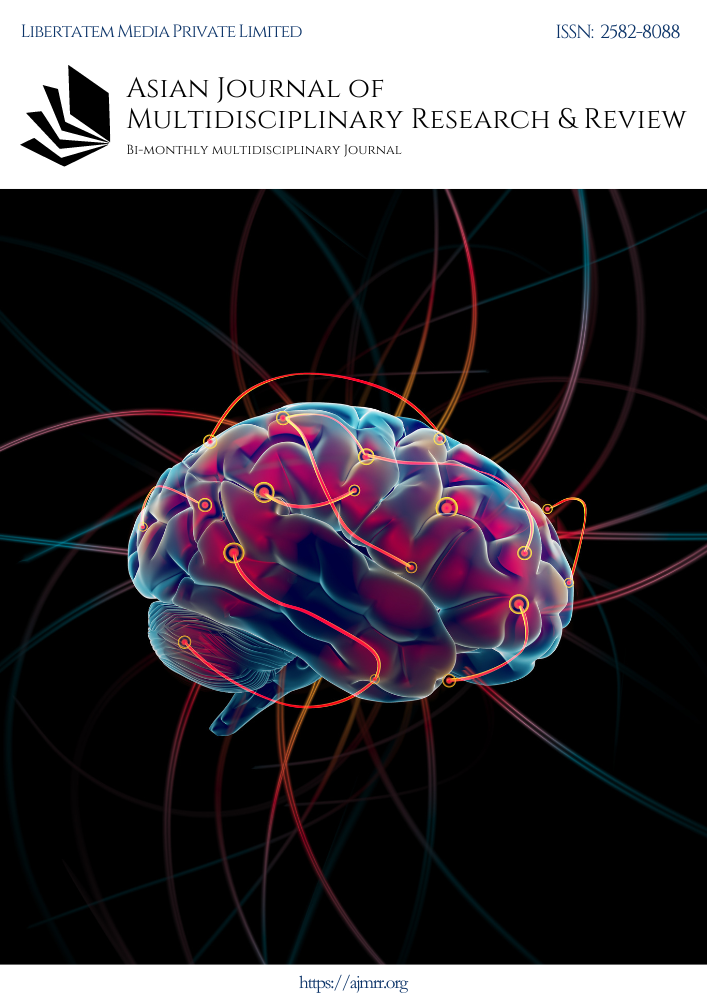Exploring Perceptions of Students and Faculty on the Integration of Research in the Outcome-based Integrated Curriculum: A Qualitative Focus Group Study at Defence Services Medical Academy Myanmar
DOI:
https://doi.org/10.55662/AJMRR.2024.5402Keywords:
Defence Services Medical Academy (DSMA), Defence Services Medical Academy, Outcome-Based Integrated Curriculum, educational initiative, MyanmarAbstract
This study explores the perceptions of students and faculty members regarding the integration of a research component in the Outcome-Based Integrated Curriculum at the Defence Services Medical Academy (DSMA) in Myanmar. Using qualitative focus group discussions, this research investigates the benefits, challenges, and overall impact of this educational initiative. The findings reveal that both students and faculty perceive the research component as beneficial, enhancing knowledge, critical thinking, and presentation skills. However, challenges related to resources, support, and early engagement need to be addressed. Recommendations for improving the research component are provided to strengthen the curriculum and better prepare graduates.
Downloads
References
Abu-Zaid, A., & Alkattan, K. (2013). Integration of scientific research training into undergraduate medical education: a reminder call. Medical education online, 18(1), 22832.
Al-Eyd, G., Achike, F., Agarwal, M., Atamna, H., Atapattu, D. N., Castro, L., Estrada, J., Ettarh, R., Hassan, S., & Lakhan, S. E. (2018). Curriculum mapping as a tool to facilitate curriculum development: a new School of Medicine experience. BMC medical education, 18, 1-8.
Anabel, T. W. V., & Simanjuntak, D. C. (2022). Obtaining preferences from a hybrid learning system to promote English-speaking ability through focus group discussion. Journal of languages and language teaching, 10(2), 118-133.
Fatmi, M., Hartling, L., Hillier, T., Campbell, S., & Oswald, A. E. (2013). The effectiveness of team-based learning on learning outcomes in health professions education: BEME Guide No. 30. Medical teacher, 35(12), e1608-e1624.
Ferguson, A., & Lee, E. (2012). Desperately seeking… relevant assessment? A case study on the potential for using online simulated group-based learning to create sustainable assessment practices. Legal Education Review, 22(1).
Mills, J., Fleck, M. R., & Kozikowski, A. (2013). Positive psychology at work: A conceptual review, state-of-practice assessment, and a look ahead. The Journal of positive psychology, 8(2), 153-164.
McLean, S. F. (2016). Case-based learning and its application in medical and health-care fields: a review of worldwide literature. Journal of medical education and curricular development, 3, JMECD. S20377.
Pratton, J., & Hales, L. W. (1986). The effects of active participation on student learning. The Journal of Educational Research, 79(4), 210-215.
Stollhans, S. (2016). Learning by teaching. Developing transferable skills. Research-publishing.net.
Swanwick, T. (2018). Understanding medical education. Understanding Medical Education: Evidence, Theory, and Practice, 1-6.
Thistlethwaite, J. E., Davies, D., Ekeocha, S., Kidd, J. M., MacDougall, C., Matthews, P., Purkis, J., & Clay, D. J. M. t. (2012). The effectiveness of case-based learning in health professional education. A BEME systematic review: BEME Guide No. 23. 34(6), e421-e444.
Wong, A., Wong, J. C., Pandey, P. U., & Wiseman, S. M. (2020). Novel techniques for intraoperative parathyroid gland identification: a comprehensive review. Expert Review of Endocrinology & Metabolism, 15(6), 439-457.
Downloads
Published
Issue
Section
Categories
License
Copyright (c) 2024 Tayzar Hein (Author)

This work is licensed under a Creative Commons Attribution-NonCommercial-ShareAlike 4.0 International License.
License Terms
Ownership and Licensing:
Authors of research papers submitted to the Asian Journal of Multidisciplinary Research & Review (AJMRR) retain the copyright of their work while granting the journal certain rights. Authors maintain ownership of the copyright and grant the journal a right of first publication. Simultaneously, authors agree to license their research papers under the Creative Commons Attribution-ShareAlike 4.0 International (CC BY-SA 4.0) License.
License Permissions:
Under the CC BY-SA 4.0 License, others are permitted to share and adapt the work, even for commercial purposes, as long as proper attribution is given to the authors and acknowledgment is made of the initial publication in the Asian Journal of Multidisciplinary Research & Review. This license allows for the broad dissemination and utilization of research papers.
Additional Distribution Arrangements:
Authors are free to enter into separate contractual arrangements for the non-exclusive distribution of the journal's published version of the work (e.g., posting it to institutional repositories or publishing it in books), provided they acknowledge the initial publication of the work in the Asian Journal of Multidisciplinary Research & Review.
Online Posting:
Authors are encouraged to share their work online (e.g., in institutional repositories or on personal websites) both prior to and during the submission process to the journal. This practice can lead to productive exchanges and greater citation of published work.
Responsibility and Liability:
Authors are responsible for ensuring that their research papers do not infringe upon the copyright, privacy, or other rights of any third party. The Asian Journal of Multidisciplinary Research & Review disclaims any liability or responsibility for any copyright infringement or violation of third-party rights in the research papers.







